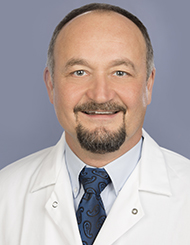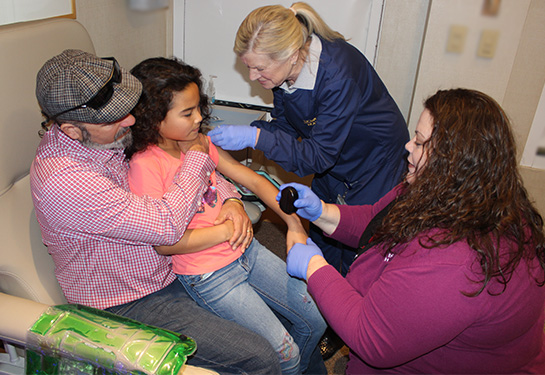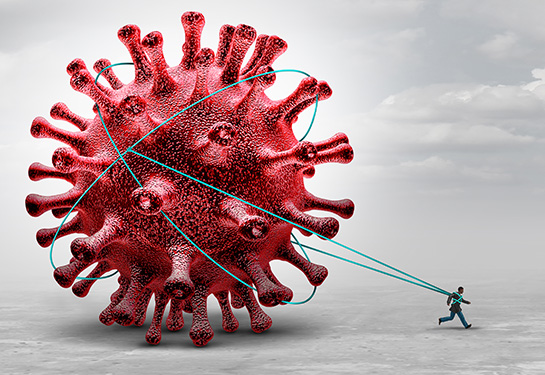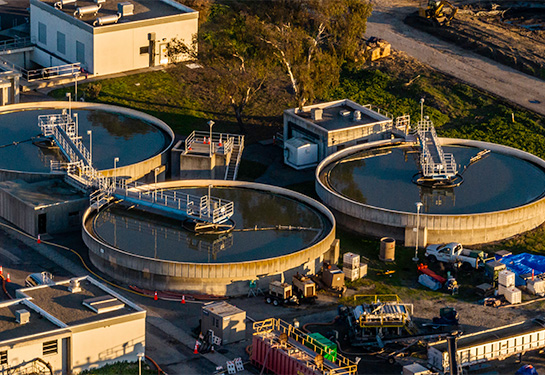UC Davis Health tests anti-inflammatory antiviral compound as COVID-19 therapy
The COVID-19 pandemic has caused more than 2.6 million deaths and 120 million infections worldwide. Scientists from different disciplines are working hard to find a drug to treat COVID-19.

Hope for treatment may have arrived from an unexpected source: an orthopedic researcher at UC Davis Health.
Dominik Haudenschild is leading a team of UC Davis researchers to test a new class of anti-inflammatory, antiviral compound as a COVID-19 treatment. The compound targets a key protein that allows the replication of both the virus causing COVID-19 and the immune cells behind damaging hyper-inflammation.
“We are developing a compound that has a strong antiviral effect and the potential to help people recover from inflammation,” said Haudenschild, professor at the Department of Orthopaedic Surgery at UC Davis Health.
Recently, Dominik Haudenschild and Jasper Yik were awarded a $1.86 million grant from the Department of Defense to test the compound’s ability to reduce the viral load and inflammation caused by SARS-CoV-2 (the virus behind COVID-19).
COVID-19’s inflated inflammation reaction
When a virus like SARS-CoV-2 invades the body, it stimulates a defensive immune response. In some cases, this response to kill the virus and virus-infected cells is so massive that it causes severe inflammation and unintended damage to healthy cells. When the damage happens in the lungs, it can lead to Acute Respiratory Distress Syndrome (ARDS), lung scarring (fibrosis) or even death.
During the immune response, an enzyme (type of protein) in the cells activates copies of the inflammatory genes to help the body kill the virus. This protein also gets highjacked by the virus to allow for virus replication.
The experimental compound will target this protein in an effort to reduce its ability to replicate the virus and decrease the hyperinflammatory response of the immune system. By curbing the replication, there is less virus to spread and a reduced inflammation damage caused by ARDS and fibrosis.
Cross-campus collaborations to combat coronavirus
This research brings together many UC Davis experts who are collaborating to fight coronavirus. Haudenschild is working with Chemistry Professor Gang-yu Liu’s group on developing an inhaled formulation of this compound. An aerosolized formulation will allow for faster drug delivery to the lungs.
“The virus that causes COVID-19 enters the body through the nasal cavities and makes its way down to the lungs,” Haudenschild said. “When the treatment is delivered via an inhaler, it can go directly to the lungs, potentially catching the virus before it spreads and multiplies.”
The research team includes Prof Lark Coffey at the UC Davis School of Veterinary Medicine. Her group will examine the antiviral effects of the compound in a mouse model with humanized ACE2. This will help determine the compound’s ability to reduce the viral burden in mice infected with SARS-CoV-2.
The team also includes UC Davis School of Medicine professors Reen Wu and Jean Chen. Together, they will study the anti-inflammatory effects of the compound on lung inflammation and scarring in mouse models. This testing will tell them about the compound’s ability to reduce inflammation linked to ARDS and lung fibrosis, common symptoms seen in patients with COVID-19.
“I could not be more proud of this collaborative effort across UC Davis Health,” said Lor Randall, professor and chair of UC Davis Department of Orthopaedic Surgery. “Our investigators have risen to the challenge to help society fight the pandemic.”
Link to Haudenschild Lab



